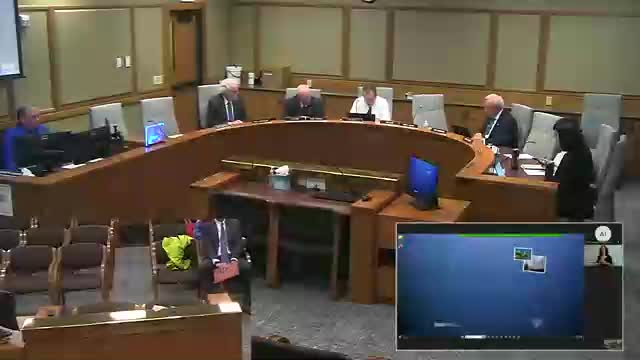Secretary of State presents $135 million biennial budget; flags elections backlog, IT and translation needs
Get AI-powered insights, summaries, and transcripts
Subscribe
Summary
Secretary of State Tobias Reed told the Oregon Senate General Government Subcommittee that his office is requesting $135 million for the 2025–27 biennium to support archives, audits, corporations, elections and administrative functions.
Secretary of State Tobias Reed told the Oregon Senate General Government Subcommittee that his office is requesting $135 million for the 2025–27 biennium to support archives, audits, corporations, elections and administrative functions.
The request seeks $135,000,000 in total: $28,400,000 (about 21 percent) in General Fund, $102,100,000 (about 76 percent) in other funds and $4,600,000 (about 3 percent) in federal funds, and would support 264 positions. Reed described the package as a “stability approach” for the coming biennium and said he expects to return to the committee in 2026–27 with a more comprehensive assessment.
Reed said the office is structured around five main program areas — archives, audits, corporations, elections and administrative services — and highlighted key figures and strains. He noted the Archives Division handled more than 6,000 records requests in 2024 and that the corporation filings operation processed about 84,000 new business registrations last year, contributing to about 524,000 active business entities statewide. For audits, Reed said the proposed budget is approximately $33 million and that the audits division includes roughly 72 FTEs.
"We are aimed at earning the trust of Oregonians," Reed said, describing integrity, accountability and competence as his priorities for the office. He also cited audit return-on-investment figures: "For every dollar that we spend on audits, we save the state $61," a metric he offered as evidence of oversight value.
Why it matters: the office is heavily fee-dependent, Reed said, with a majority of its budget drawn from business filing and other fees. That reliance makes revenue—and therefore program capacity—sensitive to broader economic conditions. Reed told the subcommittee the office’s current forecast expects to return about $88,500,000 to the General Fund from fee-generated revenue in the next biennium.
Major topics raised during the presentation included:
Elections workload and compliance: Reed and Dina Dawson, the office’s elections director, told senators and representatives the elections division is increasingly dependent on General Fund support and faces growing compliance work because of new statewide campaign finance rules. Reed said the office is managing a backlog of election law complaints and is planning a new key performance measure to track complaint resolution time. Dawson and Reed warned that implementation of House Bill 4024’s campaign finance changes will increase enforcement workload in coming years and said they expect the office will return with more detailed resource requests as that work proceeds.
ORVIS and IT modernization: Reed described continuing project-delivery challenges with the Oregon Registered Voter Information System (ORVIS) and said the office is reassessing “the right next steps” for that project. He called IT modernization and cybersecurity a cross-cutting priority across divisions and said the budget adds two IT-security positions and $500,000 proposed for endpoint protection, alerting and improved monitoring.
Cybersecurity and threat monitoring: Reed asked for continued funding to extend a third-party threat-monitoring contract to include county elections officials. He said the federal government has been reducing support in this area and the state’s need for monitoring remains high. The package would limit the service to threat monitoring and not to the kind of information-tracking some jurisdictions previously used.
Translation and the voter pamphlet: The budget request includes a position to coordinate the translation advisory committee that helps produce translated voter pamphlet content for counties. Reed said the advisory committee includes more than 25 volunteers statewide who perform translations; the new position would coordinate that work and the associated outreach. When asked whether automated translation tools could reduce staff needs, Reed and others said they will monitor technology but emphasized that native-speaker review is essential for the technical and legal language used in pamphlets.
Corporations division revenue flows: Committee members questioned why the corporations division continues to generate large transfers to the General Fund. Reed explained that business registration fees fund the corporations workload; excess revenue flows to the General Fund. The office does not propose fee increases for 2025–27 and Reed said many current fees have not changed since 2011.
Internal audit and oversight: Reed requested a new internal audit position, noting the agency has grown to a point where statute requires that function. The position would provide persistent oversight across administrations and help ensure recommendations are implemented.
Space and workforce: Deputy Secretary Michael Kaplan warned the subcommittee that the office is constrained for physical space following a prior expansion of remote work that reduced office footprint. "We are in a pretty dire situation just in terms of literal square footage," Kaplan said, while adding the office will prioritize whatever work model—on-site, hybrid or remote—best supports performance.
Budget risks and contingency planning: Reed described the office’s 10% reduction scenario and the likely effects, including slower archives response times, reduced outreach from the Small Business Assistance Office, staff reductions in corporations that would slow filings, and scaled-back voter outreach and translation services. He said the current proposal does not assume those cuts.
Next steps: The subcommittee heard that Senate Bill 5537 was the subject of the informational presentation and that a public hearing on SB 5537 was scheduled for Wednesday to take public testimony. Reed told members he expects to return to the committee in 2026 and 2027 with updated resource requests tied to ORVIS, HB 4024 implementation and other projects.
Ending: The presentation closed without any formal votes; committee members asked a range of follow-up questions and Reed and Kaplan committed to supplying additional details on languages covered by the translation committee, the scope of HAVA funding, and ORVIS next steps.
